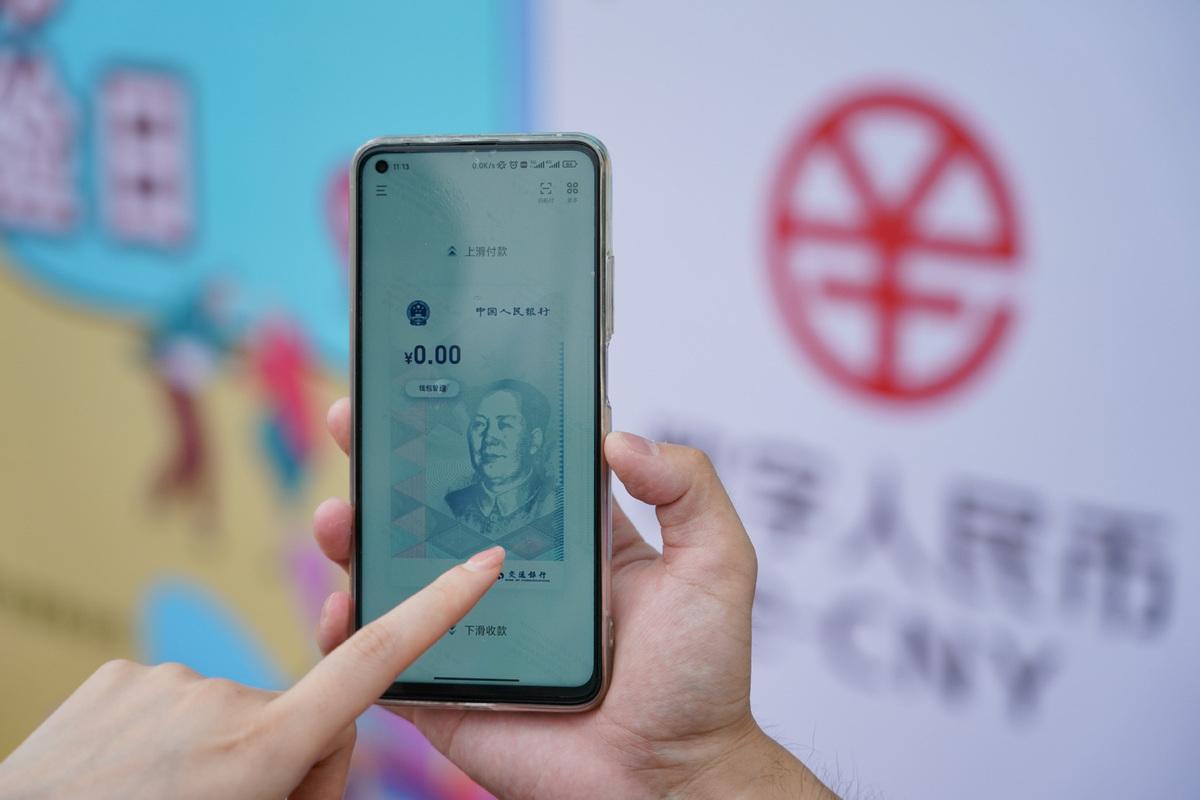

A staff member of the Bank of Communications Beijing Branch instructs a visitor to open a digital RMB wallet on a mobile phone
AIBANK, a Beijing-based digital bank, said it has become one of the first ecological partners of Ernie Bot, an AI chatbot project developed by Baidu Inc. Later, the bank will fully experience and access the abilities of Ernie Bot.
Additionally, AIBANK will stay abreast of the latest developments in the field of natural language processing (NLP), such as ChatGPT, an AI-powered chatbot developed by OpenAI, and will continue to explore how to apply NLP in the banking business, said Wu Yanjun, chief researcher of the department of information technology management at AIBANK.
On Feb 9, AIBANK launched a commercial bank digital maturity assessment model, clarifying which digital capabilities a virtual bank should possess and the corresponding evaluation methods.
During the process of digital transformation, banks must build seven digital capabilities, which include strategic planning and organizational process construction, data application and intelligent decision-making capabilities. The assessment model can help a bank identify its weak links in digital maturity and formulate a corresponding capability improvement plan.
"All digital capabilities must be applied to specific scenarios. They should be associated with a bank's business objectives. By doing so, digital capability building will gain support from the bank's business departments and senior management, and a positive atmosphere for digital transformation will be created bank-wide," said Wu.
He noted that AI will play an increasingly important role in the digital transformation of banks as the technology is suitable for mining data values and improving corresponding business capabilities.
The application of AI in the banking industry has been vigorously promoted. In recent years, China's leading banks have invested billions of yuan annually in financial technology, with a large proportion of their investments dedicated to the application of AI, said Ma Dongfeng, a partner at EY, a global leader in assurance, consulting, strategy and transactions, and tax services.
However, a common problem with technology is building trustworthy AI, which is still a barrier to the promotion of AI applications. ChatGPT also faces such a problem, Ma said.
People have found that ChatGPT is highly inducible. Based on the hints for some questions, people can induce it to respond in certain directions.
Therefore, from the perspective of trustworthiness, financial institutions still need to invest more energy in fine-tuning AI to make management decisions and control risks. It is also necessary for banks to build AI governance capabilities, Ma said.
Digital banking has taken flight in China since the start of the COVID-19 pandemic. To remain competitive, retail banks must adopt an omnichannel banking strategy focusing on customer experience, said global consultancy Bain & Company.
Currently, China's retail banking industry has formed an integrated omnichannel pattern of branches, automated teller machines, customer service hotlines, mobile banking, online banking, and WeChat public accounts.
Bain's latest research found that mobile banking and online banking were the most frequently used channels by retail customers on the Chinese mainland over the past 12 months. During this period, up to 83 percent of respondents used mobile banking and 62 percent used online banking, according to a survey of 1,800 retail banking customers on the mainland.
Although nearly half of the respondents did not visit bank branches in the past 12 months, the limited number of branch visits actually had a huge impact on banks in terms of pleasing or displeasing customers.
The survey shows that branch and mobile banking channels drive customer experience together. While continuing to implement the "mobile first" strategy, it is important to firmly grasp the offline branch experience, create the moment of pleasing customers, and ensure seamless connectivity and switching between channels.
In recent years, technologies have been gradually applied to the financial industry, providing more convenient, more inclusive and simpler services, the research report said.
"Digital capabilities can help financial institutions reach more customers and serve them well. To compete, traditional banks must expand their digital capabilities, specifically around AI, big data, cloud computing and automation," said Scully Cui, a Bain & Company partner.
"At the same time, banks need to deliver simple digital experiences. Mobile navigation should be intuitive and stress-free, even for complex products and services," said Cui.
